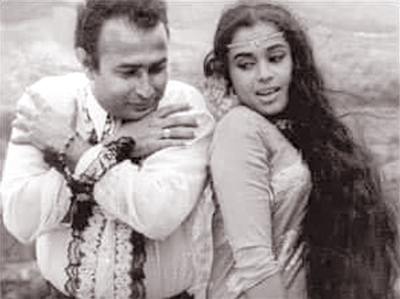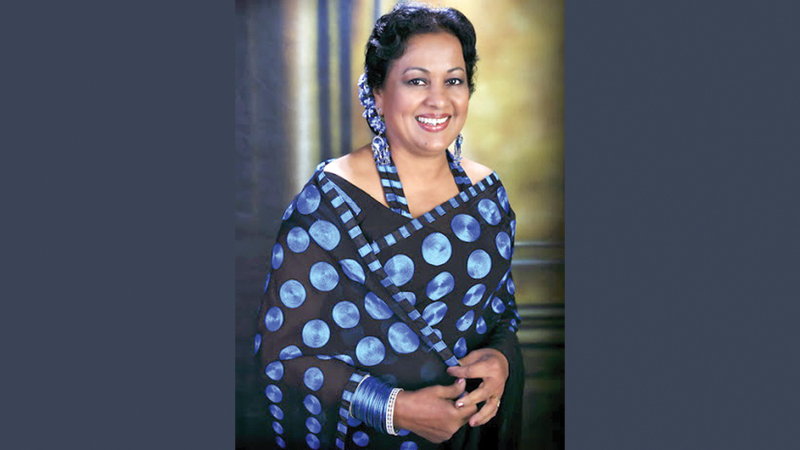The ‘Queen of Actresses’, Malini Fonseka, who graced local cinema with her acting talent for six decades, brought tears to the eyes of Sri Lankan film fans as she passed away at the age of 78.
Born in Kelaniya, a haven for popular artistes, Wanniarachchige Malini Senehelatha Fonseka received her primary education at St. John’s College, Nugegoda, and later attended Gurukula College, Kelaniya. Demonstrating an innate talent for acting, she won the Best Actress award for her performance in the stage play Akal Wessa, produced by Sumana Alokabandara in 1968. This performance marked a turning point in her artistic career, as it opened the doors of cinema to her.
Malini’s cinema in the 1970s and 80s
The 1970s marked the beginning of the Malini Fonseka era, as she took on a role in the film Punchi Baba , produced by Sugathapala Marasinghe and directed by Tissa Liyanasuriya. From that point onward, Malini extended her influence across every film genre—both Classical and commercial—over a span of six decades. In addition to her acting talent, she became an icon of Sri Lankan female beauty during that time. She was honoured with the Deepashikha Award for Most Popular Actress in 1972 and 1973 years and went on to be the Most Popular Actress at the Sarasaviya Awards from 1976, and then consistently from 1979 to 1985.
She won the 1972 Critics’ Award for Best Actress for her outstanding performance in Lester James Peries’s film Nidhanaya. The Jury Special Honour Award that Malani received for her role in Dharmasena Pathiraja’s Eya dan Loku Lamayek at the 9th Moscow International Film Festival in 1975 is considered the first international award ever presented to a Sinhala film actress. In 1977, she was also awarded a Certificate of Merit for her performance in Amaranath Jayathilaka’s Siripala ha Ranmenika at the 6th New Delhi International Film Festival in India.
She also received the OCIC Award for her outstanding performances in Eya dan Loku Lamayek, Siripala ha Ranmenika, and Deviyani Oba Koheda in the same year. Malini won the Presidential Award for Best Actress in 1978 for Bambaru Awith, and again in 1979 for Vasanthe Dawasak direct by T. Arjun. She also received the Sarasaviya Award for Best Actress for Hingana Kolla.

Malini and Gamini
In 1981, she achieved the rare distinction of winning both the Presidential and Sarasaviya Awards for Best Actress for her performance in Aradhana. The following year, in 1982, she was honoured with the Sarasaviya Award for Best Actress for Yasa Isuru. Malini was also recognised as both Best Actress and Most Popular Actress for four consecutive years—1979, 1980, 1981, and 1982.
In 2009, Malini Fonseka received the Silver Peacock Award for Best Performance at the 39th International Film Festival of India for her role in Prasanna Vithanage’s Akasa Kusum. The following year, in 2010, she once again won Best Actress for the same film at the 7th Levante International Film Festival, Italy.
In 2014, Malini was honoured with a special award at the 16th Deauville Asian Film Awards in France, recognising her 50 years of contribution to cinema. At the time, the Sri Lankan Ambassador to France was Karunaratne Hangawatte—a former film actor and the husband of her sister, the popular actress Rasadari Fonseka.
Malini’s performances in films such as Nidhanaya, Eya Adha Loku Lamayek, Bambaru Awith, Soldadu Unnehe, Induta Mal Mitak, Siripala ha Ranmenika, Ektam Gee, Sthree, and Akasa Kusum will forever be remembered. With a wide range of roles in both black-and-white and colour cinema, Malini Fonseka was an actress who helped shape multiple eras of Sri Lankan commercial cinema. It would not be an exaggeration to say that Sinhala cinema revolved around her for decades.
In the early years, pairings such as Gamini–Malini, Vijaya–Malini, Tissa–Malani, Tony-Malini, Ravindra–Malini, Sanath–Malini, and Lucky–Malini played a significant role in drawing audiences to the cinema. There is no doubt that Malini was a guiding light for many of these leading actors, helping them reach the heights of popular cinema through her presence and powerful performances.
Malini once had the opportunity to make her acting debut in a South Indian Tamil film. She starred opposite Sivaji Ganesan—one of the most celebrated actors in South Indian cinema—in the Indo–Sri Lankan joint production Pilot Premnath, directed by A.C. Thirulokchander.
In addition to acting, Malini is also one of the few female directors in the predominantly male-dominated Sinhala film industry. She has directed three films: Sasara Chethana, Ahinsa and Sthree.
Malini’s political role
Malini Fonseka’s influence extended beyond cinema into the political sphere as well. Like many prominent filmmakers in Sri Lanka, she often—knowingly or unknowingly—used her popularity to shape political outcomes. During the J.R.- Premadasa era, she appeared on the United National Party’s election platform. Later, in 2010, she entered Parliament through the National List, representing the United People’s Freedom Alliance under the Mahinda Rajapaksa Government.
Widely accepted by Sri Lankans as the undisputed queen of cinema—transcending ethnic and social boundaries—Malini Fonseka eventually found herself drawn into the political turbulence of the country. During the final stages of the war against the Tamils, she expressed support for the Rajapaksa Government and participated in political activities such as Sathyagraha, aligning herself with its wartime agenda. This stood in stark contrast to her earlier actions during the anti-Tamil violence of July 1983, when she had courageously intervened to protect her Tamil neighbours from Sinhala nationalist mobs.
Given the complexities of Sri Lankan politics, it would be unjust to single out Malini for her later political positions. Like many others, she was swept up in a wave of nationalism and militarised sentiment. Still, there is no denying that her political alignment gradually dimmed the brilliance of a film star once embraced with deep affection by people of all communities.
The Rajapaksa regime, knowingly or unknowingly, utilised Malini for its political purposes. Just as leading men in cinema—from Gamini Fonseka to Lucky Dias—drew light and strength from her star power, the Rajapaksa’s did so even more effectively in the political arena. Yet unlike in cinema, Malini gained little from politics—only public criticism, insults, and humiliation.
The controversy over her receiving financial assistance from the President’s Fund also emerged not because she was a respected artiste, but because she had served as an MP through the National List. Had she been recognised purely as an actress, there is no doubt she would have been honoured and respected by all.
Many popular stars have entered politics, either by choice or under the influence of others, but few have found lasting success. Sri Lankan political history offers many such examples—and among them stands the queen of actresses, Malini Fonseka.
Until her passing at the age of 78, Malini continued to contribute to Sri Lankan cinema and television. Several films featuring her are still awaiting release, a testament to her enduring presence in the industry.
Malini was a courageous woman who stood shoulder to shoulder with men in both cinema and politics. While she may not have succeeded in the unfamiliar world of politics, she overcame numerous challenges in cinema with strength and grace. Though her life has come to an end, the star named Malini will continue to shine brightly in the hearts of her admirers.







